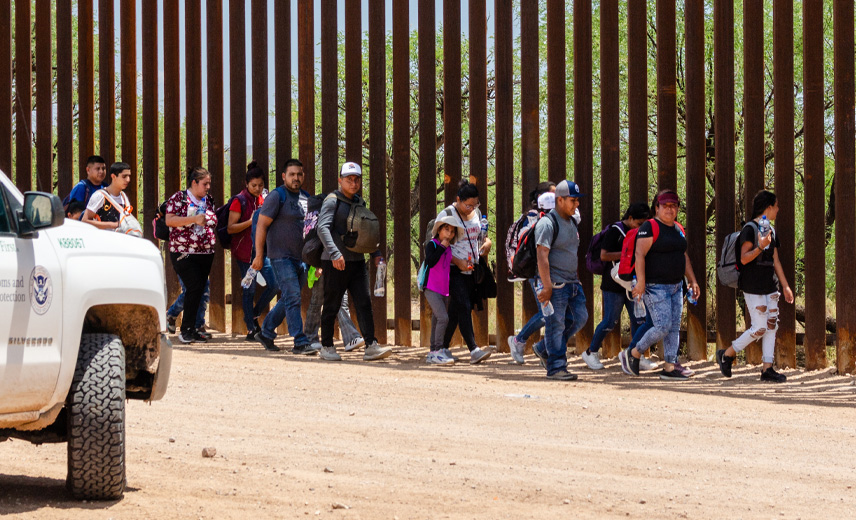It’s polling season, and while there might be issues with many national polls that tend to undersample Latino voters, it’s always important to highlight election and policy polls that focus primarily on the country’s estimated 36.2 million Latino electorate in 2024.
On Thursday afternoon, The Latino Newsletter attended a press call organized by UnidosUS, the country’s largest Latino civil rights group, to discuss Latinos’ attitudes toward immigration and border security.
We created a live thread on Twitter (we refuse to call it X) about the findings.
Here are just some of the highlights from that thread:
The UnidosUS media release, called “Fair, Firm, and Free of Cruelty” and shared after the briefing, quoted the following:
Key findings:
While economic concerns continue to top the list of priorities for Hispanic voters, immigration has moved up on that list, with half of Latino voters stating the issue will have a big impact on their vote for President and Congress.
When thinking about the U.S. immigration system overall, Hispanic voters’ top priorities are:
Providing a path to citizenship for people with long-term undocumented status (53%) and DACA recipients (42%).
Cracking down on human smugglers (29%), increasing border security (28%) and increasing legal immigration (27%) form a second tier of priorities.
Finishing the border wall (15%) and deporting all undocumented immigrants (15%) are among the lowest priorities.
Latino/a voters are more frustrated by the lack of support for long-term immigrants (39%) than by the situation at the border (26%); 21% say both, 9% say neither.
That said, more than three-quarters of Hispanic voters (76%) are concerned about the situation at the U.S./Mexico border, and nearly half (46%) are very concerned.
They remain broadly sympathetic to immigrants arriving at the U.S./Mexico border (23% very sympathetic/62% sympathetic); 22% are not sympathetic.
On specific priorities for addressing the situation at the southern border, Hispanic voters identified the following as high priorities:
Latino voters overwhelmingly prioritize cracking down on human traffickers and drug smugglers (82%) and notably, providing a path to citizenship for long-term undocumented immigrants (62%).
The next tier of priorities includes expanding funding for additional border patrol and security (58%) and partnering with other countries to limit illegal immigration to the U.S. (53%).
Finishing the border wall, closing the border and rapidly deporting those who cross illegally were among the lowest priorities, but 38% and 39% were open to those initiatives.
Of measures related specifically to asylum seekers at the border:
The highest priority is partnering with other countries to expand opportunities for asylum seekers to seek protection elsewhere (53%), followed by making it easier for newly arrived asylum seekers to obtain work permits (48%), allowing asylum seekers to apply for U.S. asylum from other countries (47%), expand legal pathways for people seeking safety in the US (47%) and increasing funding to speed up the processing time for asylum claims (43%).
47% see providing more resources and support to US communities receiving immigrants as a high priority.
On the politics of the debate:
Four in ten (41%) Latino voters say they hear more from Republicans about immigration; 27% say they hear more from President Biden and Democrats.
Nearly eight in ten Latino/a voters (78%) say that the candidates’ positions on immigration will have an impact on their vote for President in November, with nearly half (49%) of voters saying it will have a big impact.
Latino/a voters prefer Democrats (38%) to Republicans (31%) on immigration by a narrow margin, while nearly one quarter (23%) say neither party is better.
The link below takes you to the full memo and polling results:
Later on Thursday, UnidosUS shared a video of the entire press call.
The Red Scare and Statehood for Puerto Rico
On Thursday, the United Nations continued its Special Committee on Decolonization hearing, with several petitioners discussing Puerto Rico’s colonial status. Statehood proponents and independence supporters spoke. Given that Congress continues to kick the status question down the road, it’s become somewhat of a tradition for the UN to host such discussions. The vast majority of speakers made their cases, and there was nothing new we hadn’t heard before. Symbolically, it’s always a good thing when Puerto Rico is being discussed in public.
Still, the following comments from statehood proponent Ricardo Santiago caught our attention—not just for their factual inaccuracies but for the false claims that anyone who supports independence for Puerto Rico is a communist.
No matter one’s position on this matter, maybe the debate can be elevated in general and not be reduced to remarks that do nothing to advance the issue. That’s the hope.
Have any story ideas or tips? Want to pitch us? Email Julio Ricardo Varela here.

